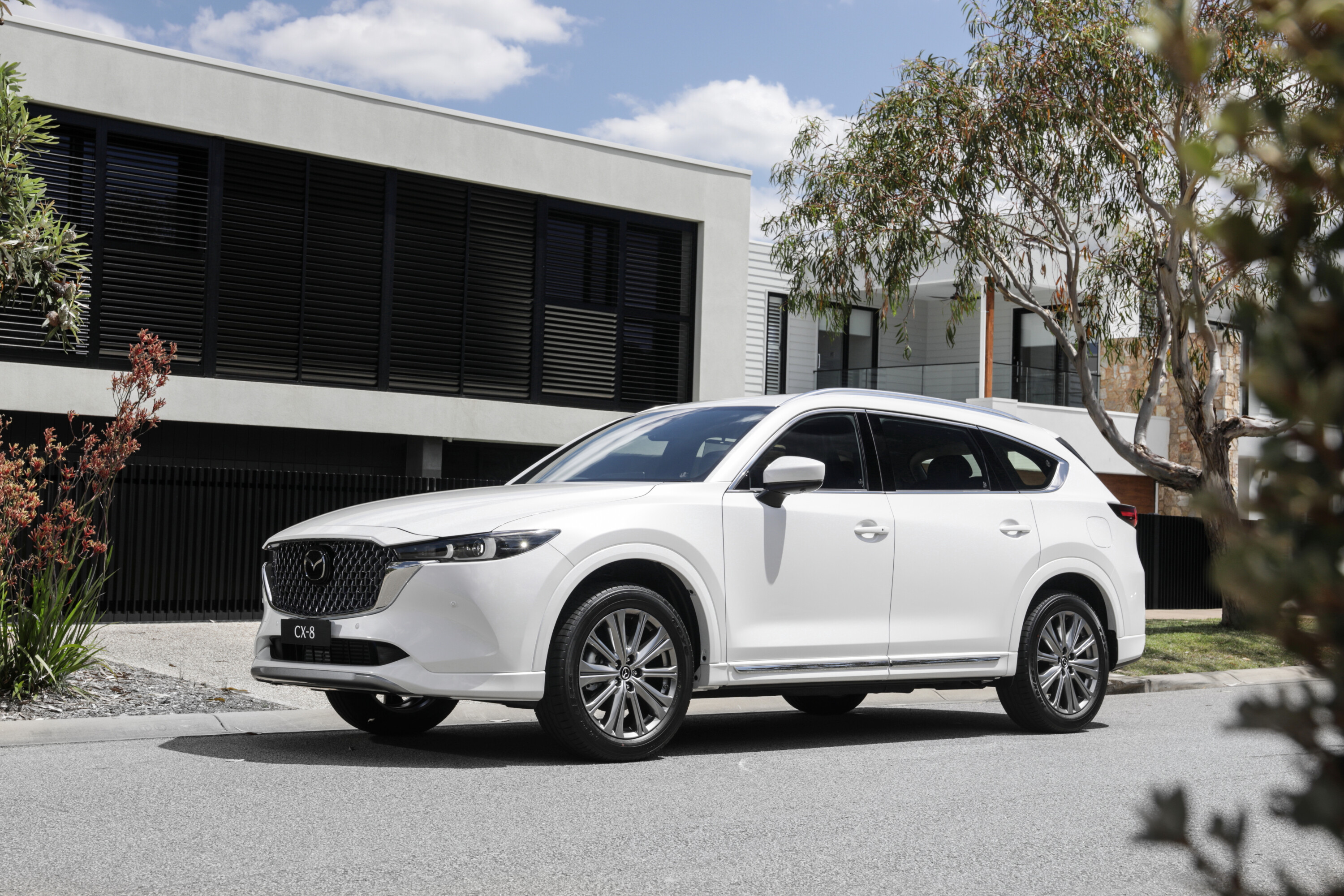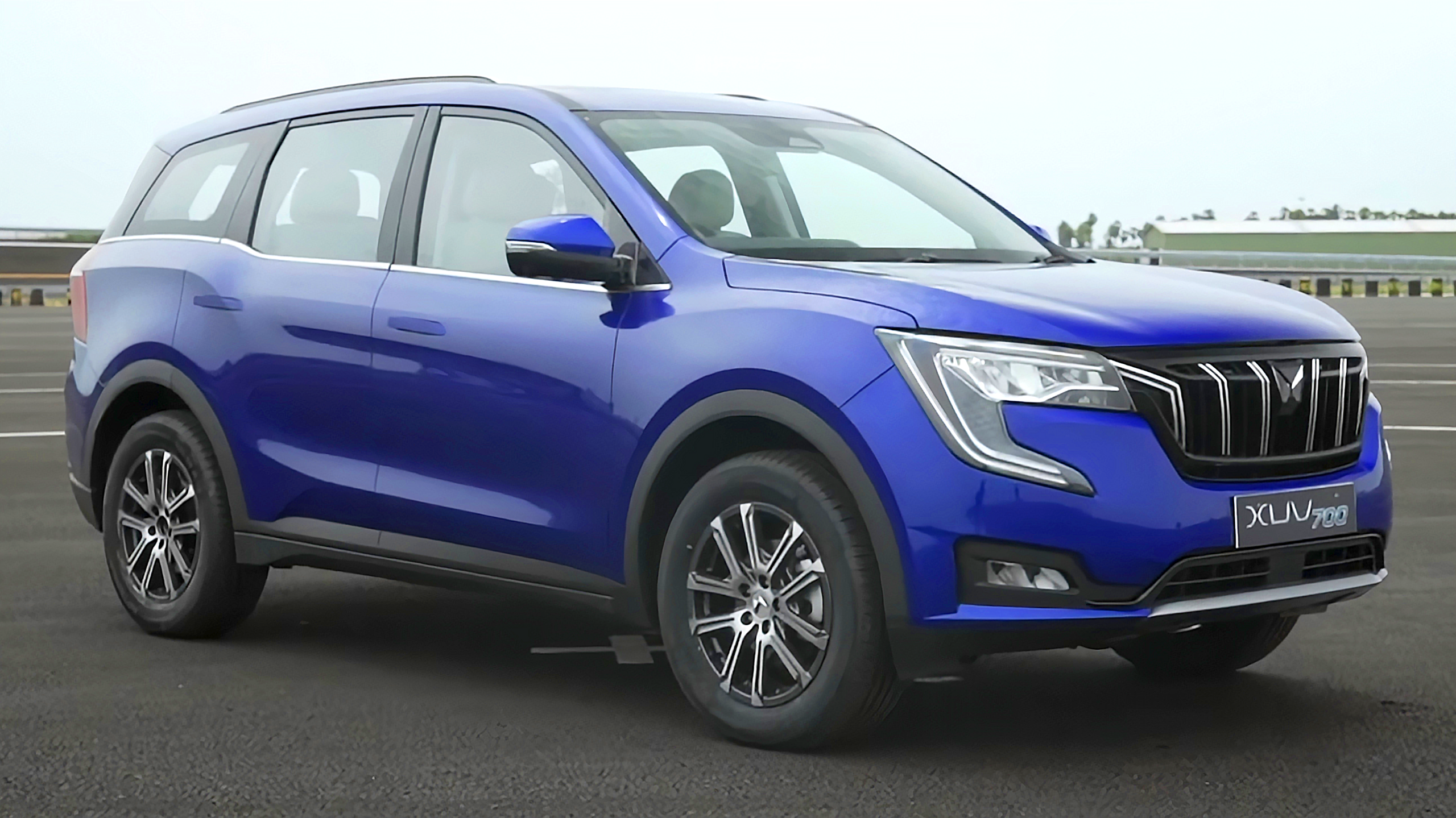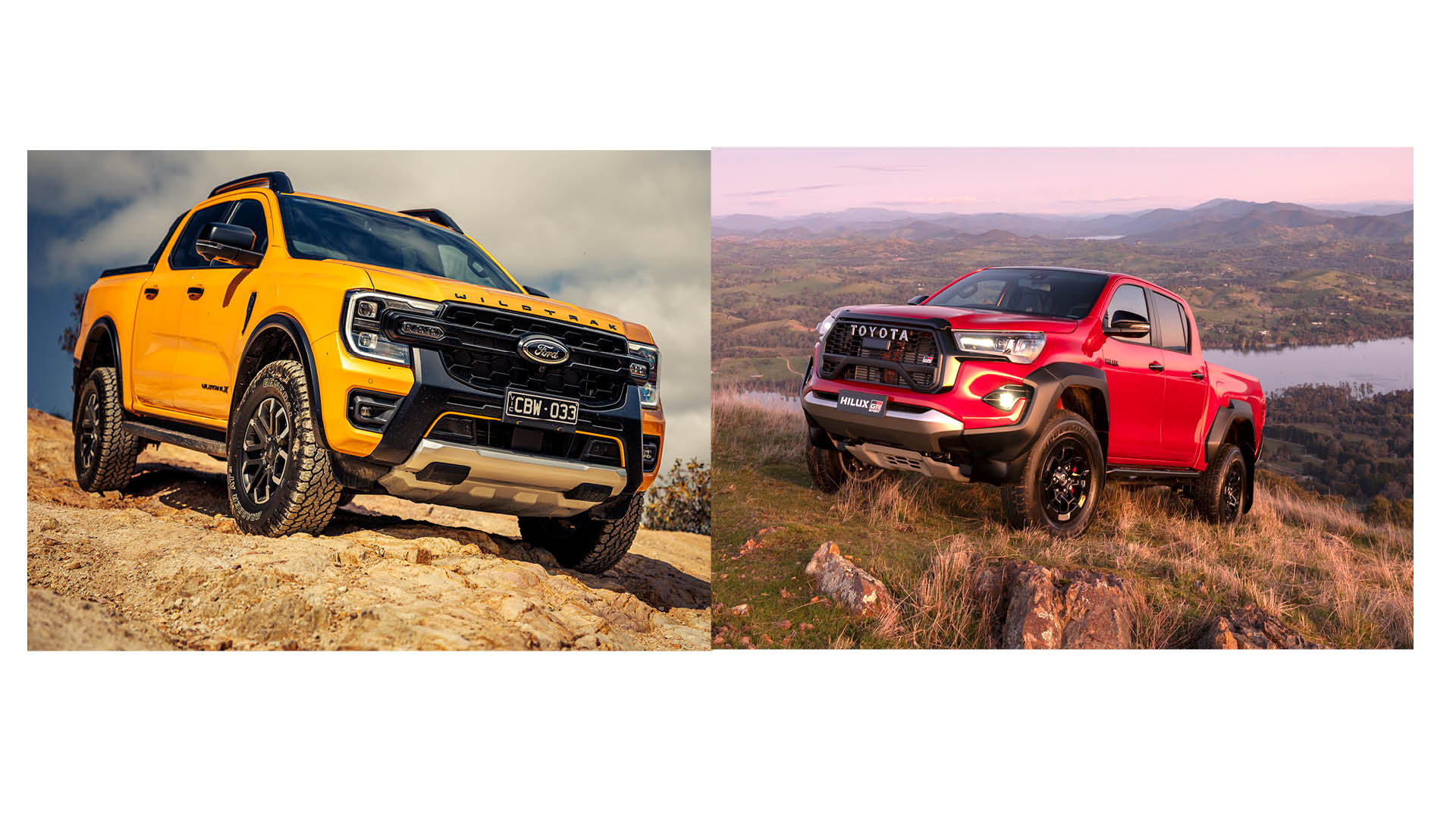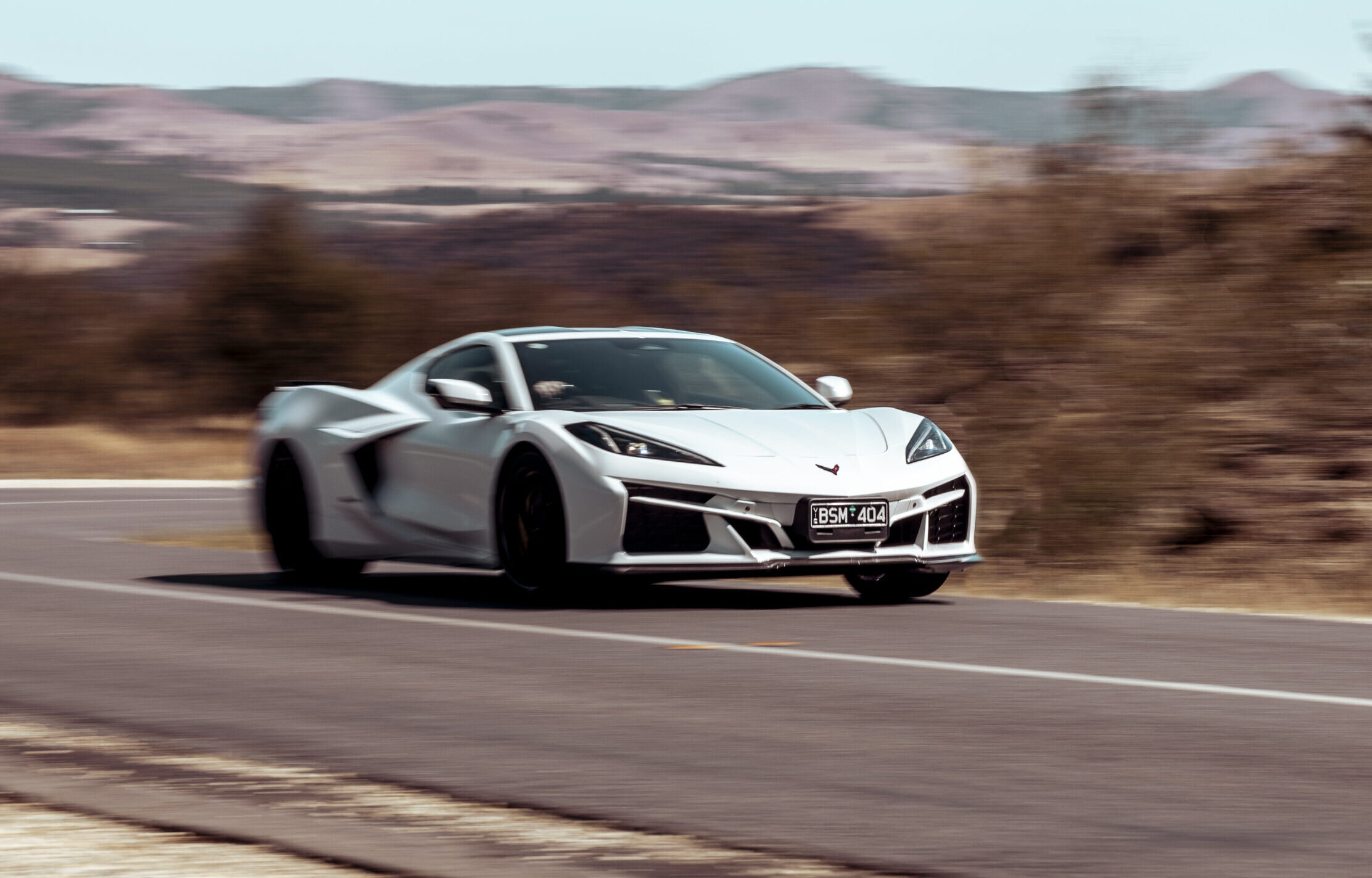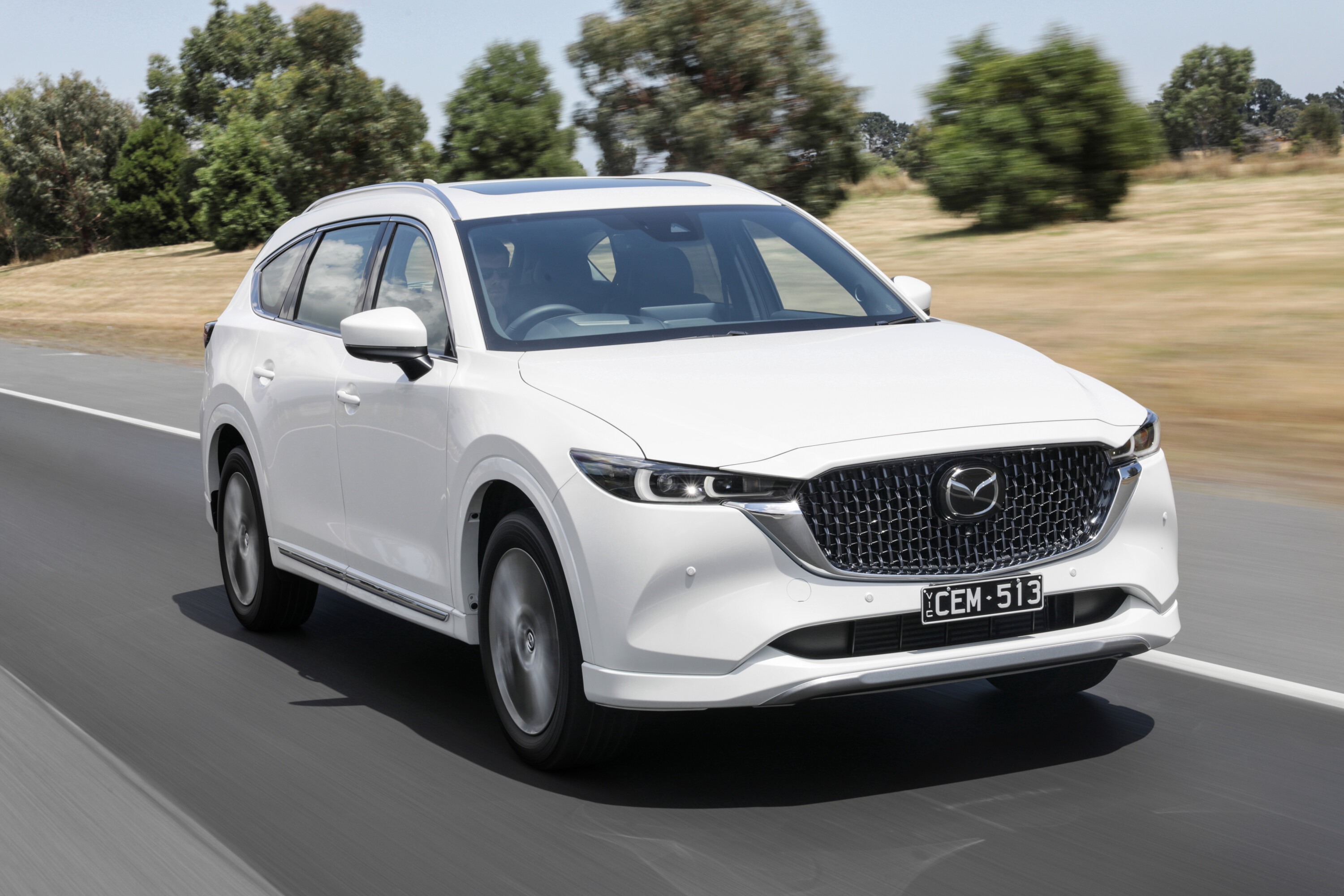
Score breakdown
Things we like
- Smooth, torquey diesel
- Refined cabin
- Third-row can seat adults
Not so much
- No daytime running lamps for base variants
- Lethargic non-turbo petrol
- Tight rear headroom
It’s hard to believe half a decade has passed since Mazda’s ‘goldilocks’ SUV, the CX-8, launched in Australia.
Back then, the large CX-8 – essentially a stretched three-row version of the midsized CX-5 riding on a CX-9 wheelbase – was offered exclusively in diesel form, as competition to the Sorento, Santa Fe and Tiguan Allspace that sit at the smaller end of the large SUV segment.
Then, two years later, Mazda’s local arm elected to fit a non-turbo petrol engine on some variants, which led to rising sales against Australia’s reduced demand for diesel-powered passenger vehicles.
However, the CX-8 faced competition from within: the popular and powerful CX-9. The 2017 Wheels Car of the Year-winner simply ticks too many boxes, especially with its sweet turbocharged petrol engine.
Mazda has sold around 20,000 CX-8s in Australia in the past five years, compared to 37,000 CX-9s and 134,000 CX-5s.
Things are a little different now, though. Mazda will end CX-9 production at the end of 2023 to make way for two new three-row SUVs based on its rear-biased Large Architecture, the CX-80 confirmed for Australia and the CX-90 due in August. It has no plans to discontinue the CX-8.
This means the 2023 Mazda CX-8 needs to step up as Mazda’s solo budget-focused large SUV – and it has just received a mid-life update to assist.
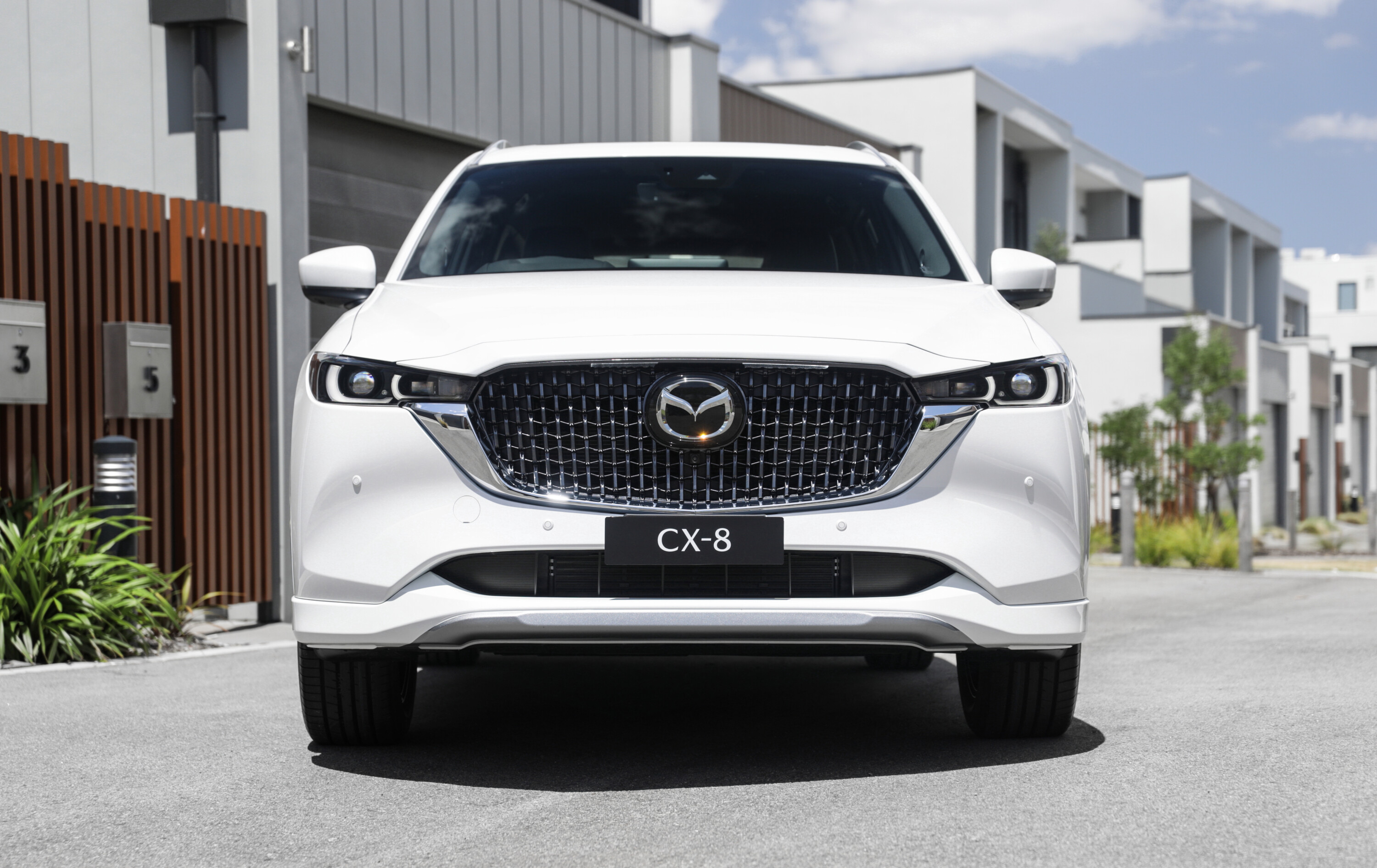
For this update, the CX-8 receives a sleek new face inspired by its CX-5 twin, and a streamlined range with new Touring Active diesel and GT SP variants, replacing the old Touring diesel, Touring SP and GT grades.
As is now the industry norm, prices have increased by up to $1450 – but, importantly, you’ll find more equipment than ever, including a larger 10.25-inch widescreen infotainment system with wireless Apple CarPlay and Android Auto as standard.
There are still no daytime running lamps for the entry-level Sport and Touring, which seems like a wild safety and design oversight in 2023. It’s the same for base CX-5s in Australia.

JUMP AHEAD
- How much is it, and what do you get?
- How do rivals compare on value?
- Interior comfort, space and storage
- Technology in the cabin
- What is it like to drive?
- How much fuel does it use?
- How safe is it?
- Warranty and running costs
- VERDICT
- Specifications
How much is it, and what do you get?
The 2023 Mazda CX-8 starts at a reasonable $42,060 before on-road costs, with a circa-$30k gap to the $71,490 flagship.
Five grades are available, including the new-for-2023 Touring Active and GT SP.
| 2023 Mazda CX-8 standard features | |
|---|---|
| 10.25-inch infotainment system | LED headlights and tail-lights |
| Wireless Apple CarPlay and Android Auto | Head-up display |
| DAB+ digital radio | Three-zone climate control |
| Satellite navigation | Keyless window open |
| 7-inch semi-digital instrument cluster | Tyre pressure monitoring |
| Leather-wrapped steering wheel and gear shifter | Heated, auto-folding side mirrors |
Equipment for the base Sport includes 17-inch alloy wheels, rear parking sensors, black cloth upholstery, a six-speaker audio system, and a reverse camera.
New for 2023 are the 10.25-inch Mazda Connect infotainment system and 7-inch semi-digital instrument cluster, wireless Apple CarPlay and Android Auto, front USB-C ports – and several noise, vibration and harness improvements to improve ride quality.
Front parking sensors, keyless entry, black leather upholstery, a power-adjustable eight-way driver’s and six-way passenger seat, heated front seats, a fold-down rear-centre armrest with two USB-A charge ports, (a slow) one-touch walk-in switch, and paddle shifters are added for the mid-spec Touring.

The newly-added Touring Active has a rugged theme as a diesel AWD-only offering, with machined 19-inch alloy wheels, black side mirrors, white/grey Maztex artificial leather and cloth upholstery, an adaptive front-lighting system, LED daytime running lamps, 10-way power-adjustable driver’s seat with two-position memory, and heated front and rear seats.
Replacing the previous Touring SP and GT, the SP combines the features of both – at $1550 more than last year’s GT.
For 2023, it has gloss black alloy wheels and body cladding, black or burgundy red leather upholstery, and traffic jam assist, while retaining the old GT’s wireless phone charger, glass sunroof, 10-speaker, 273-watt Bose audio system, (non-hands-free) electric tailgate, third-row USB-A ports, rear door window shades, and LED cabin lighting.
Due to the ongoing semiconductor chip shortage, Mazda has removed the hands-free kick function for the CX-8’s electric tailgate. This feature was also deleted from the CX-5 due to supply constraints in mid-2022.
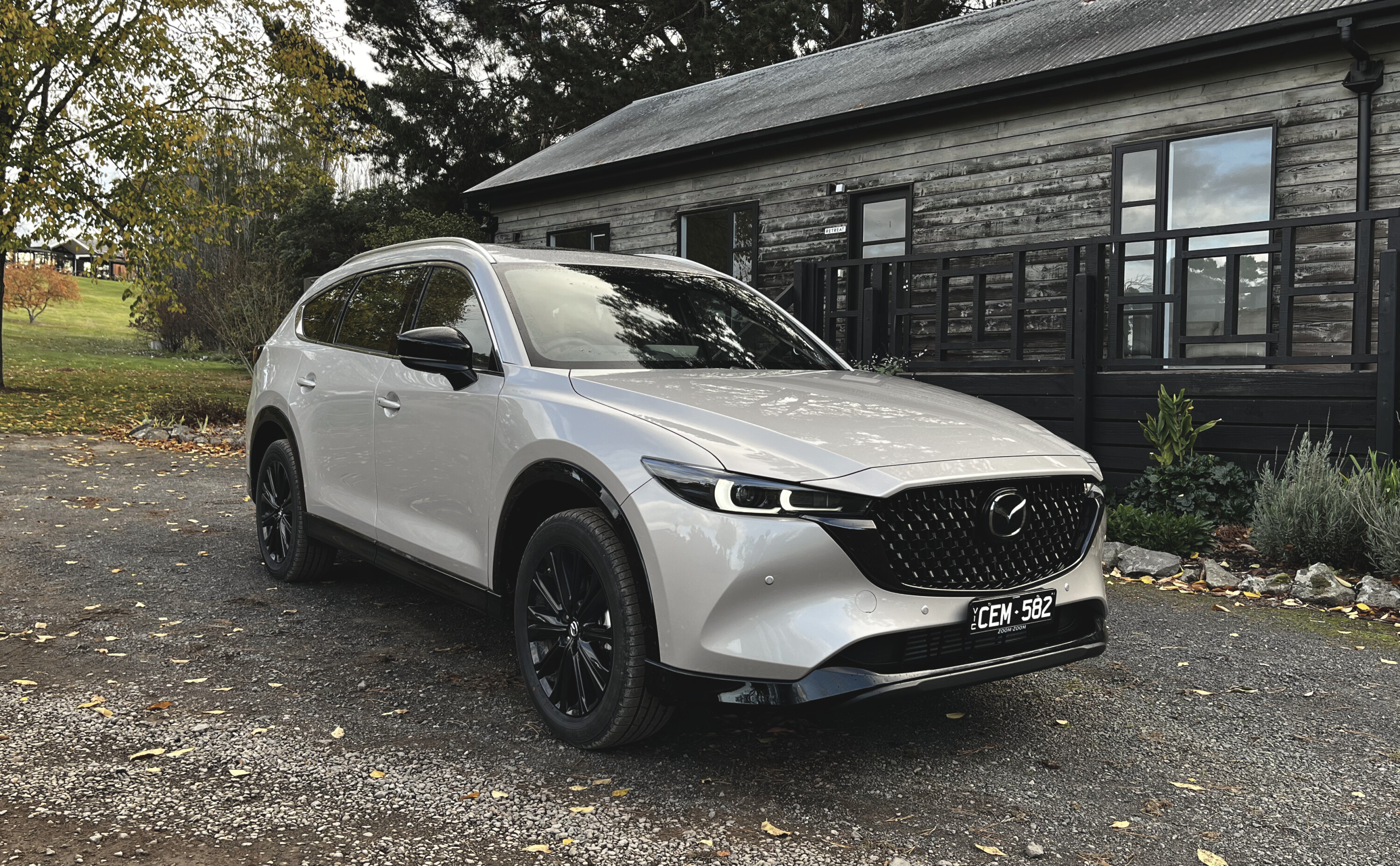
The flagship Asaki reverts to silver alloy wheels and body-coloured side mirrors, while it follows its range-topping CX-5 sibling with colour-matched body cladding and larger diameter tailpipes added for the facelift.
Other additions include adaptive headlights, ventilated front seats, black Nappa leather upholstery (replacing light brown), a 360-degree camera system, a frameless rear-view mirror, and added luxuries such as chrome seat knobs and subtle white-only LED interior ambient lighting.
While it would be nice if the 360-degree camera were available on the Touring Active and GT SP, this isn’t unusual with the technology also limited to its flagship competitors.
Second-row opulence is the focus of the Asaki LE, with heated and ventilated power-adjustable captain’s chairs, a fixed centre console, and optional white Nappa leather upholstery. It is exclusively available in diesel AWD guise.
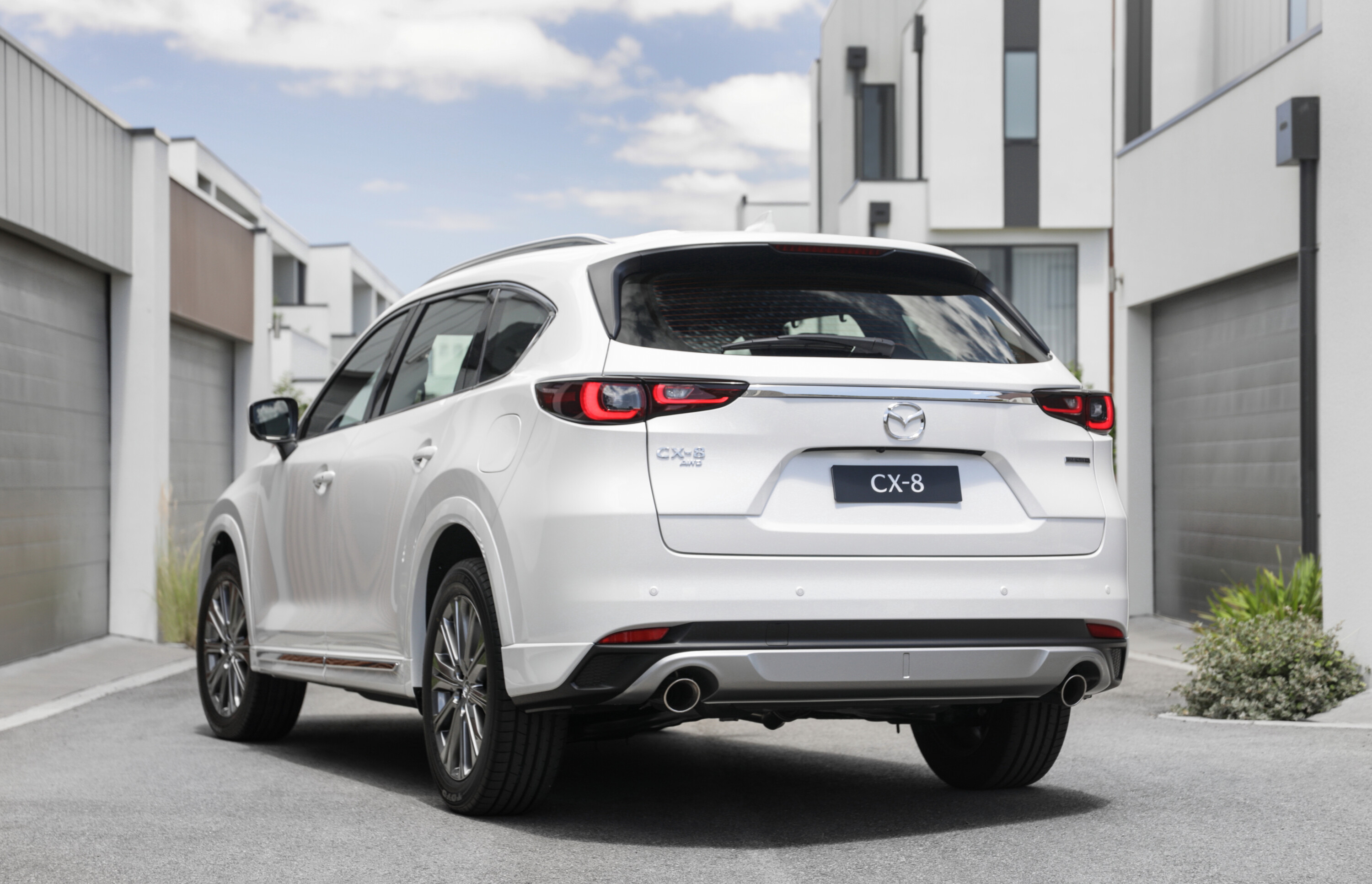
Mazda Australia forecasts 40 per cent of buyers will opt for the mid-spec Touring in 2023, followed by 30 per cent for the entry-level Sport.
The GT SP follows at 12 per cent, Asaki and Asaki LE at 10 per cent, and the newly-introduced diesel-only Touring Active at eight per cent.
Available colours for all models include rhodium white, platinum quartz, titanium flash, soul red crystal, machine grey, polymetal grey, deep crystal blue, and jet black. Premium paint incurs a $795 premium.
| 2023 Mazda CX-8 pricing (before on-road costs) | ||
|---|---|---|
| G25 Sport FWD | $42,060 | up $1450 |
| G25 Touring FWD | $48,960 | up $1450 |
| D35 Sport AWD | $49,060 | up $1450 |
| D35 Touring Active AWD | $56,910 | new (up $2400 vs. Touring diesel) |
| G25 GT SP FWD | $58,560 | new (up $1550 vs. GT) |
| G25 Asaki FWD | $61,810 | up $1400 |
| D35 GT SP AWD | $65,560 | new (up $1550 vs. GT) |
| D35 Asaki AWD | $68,810 | up $1400 |
| D35 Asaki LE AWD | $71,410 | up $1400 |
How do rivals compare on value?
The Mazda CX-8’s competitors are the Kia Sorento, Hyundai Santa Fe, Volkswagen Tiguan Allspace, Skoda Kodiaq, and the seven-seat Nissan X-Trail and Mitsubishi Outlander.
All cars start between $40,000 and $50,000, with a similar difference in features for each model’s respective grade walk. Unlike the Mazda, you’ll find a full-digital instrument cluster on at least some variants if that’s your thing.
At the top end, it also overlaps bigger large SUVs, including Mazda’s own CX-9, the popular Toyota Kluger, the Hyundai Palisade, and the Nissan Pathfinder.
Fuel-sipping hybrid versions of the Sorento, Santa Fe and Kluger are also available – including the plug-in hybrid Sorento, though it’s significantly more expensive and faces scarce supply in Australia.
Watch for our Best Large SUV group test to land soon, or see our current recommendations at the link below.
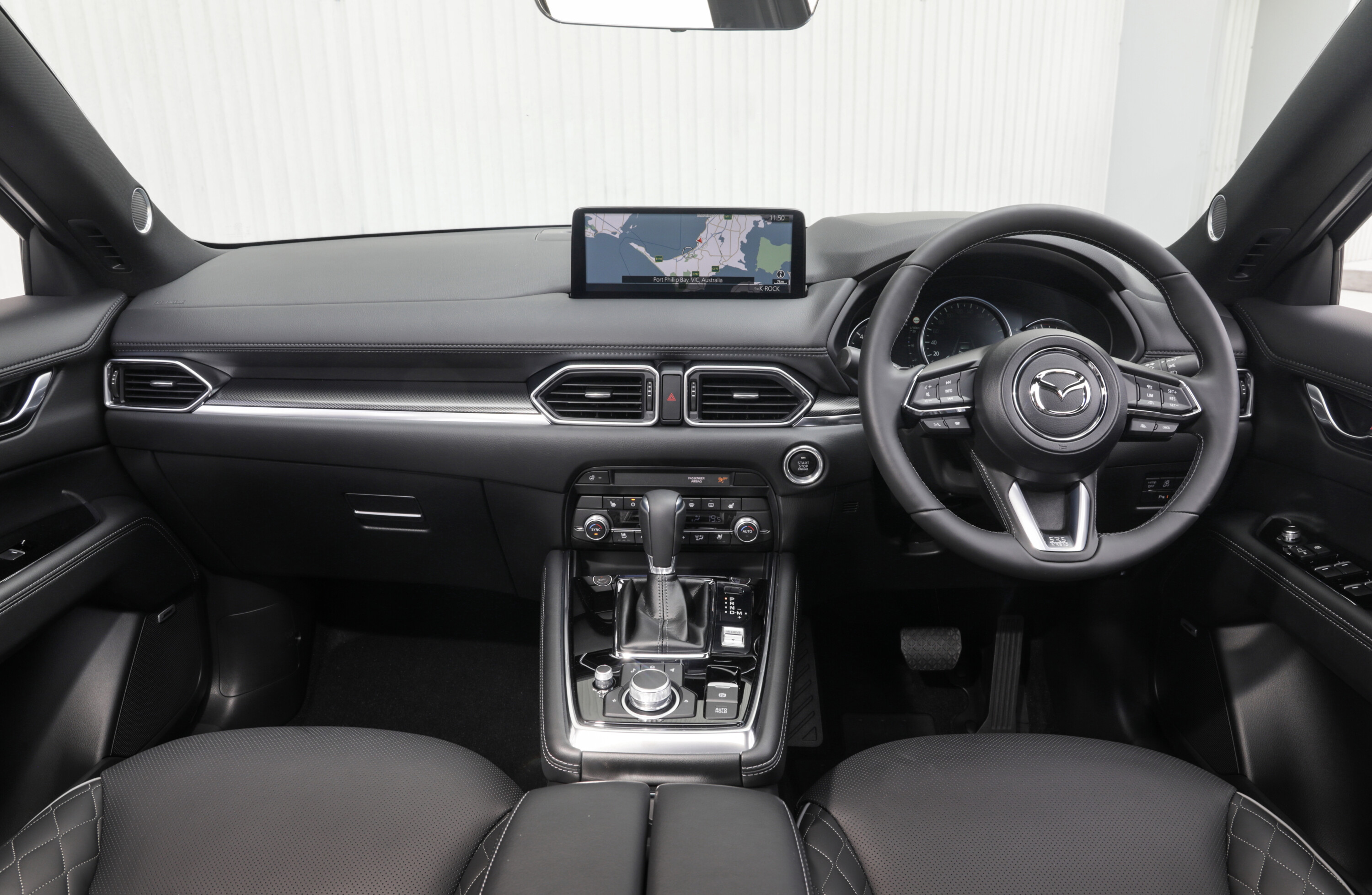
Interior quality, comfort, space and storage
The top-shelf CX-8 Asaki LE provides a chauffeur-like experience on a relative budget, but you’ll still be impressed no matter which spec is fancied.
The second-row captain’s chairs, black or white quilted Nappa upholstery and other unique touches help to lift the Asaki LE’s cabin ambience, but even the base Sport has quality-feeling materials and solid build quality.
While there are no design changes beyond new colour options, Mazda has redesigned the CX-8’s front seats to optimise the “S-curve spinal shape of the front-seat occupants for even more comfort in a natural posture”.
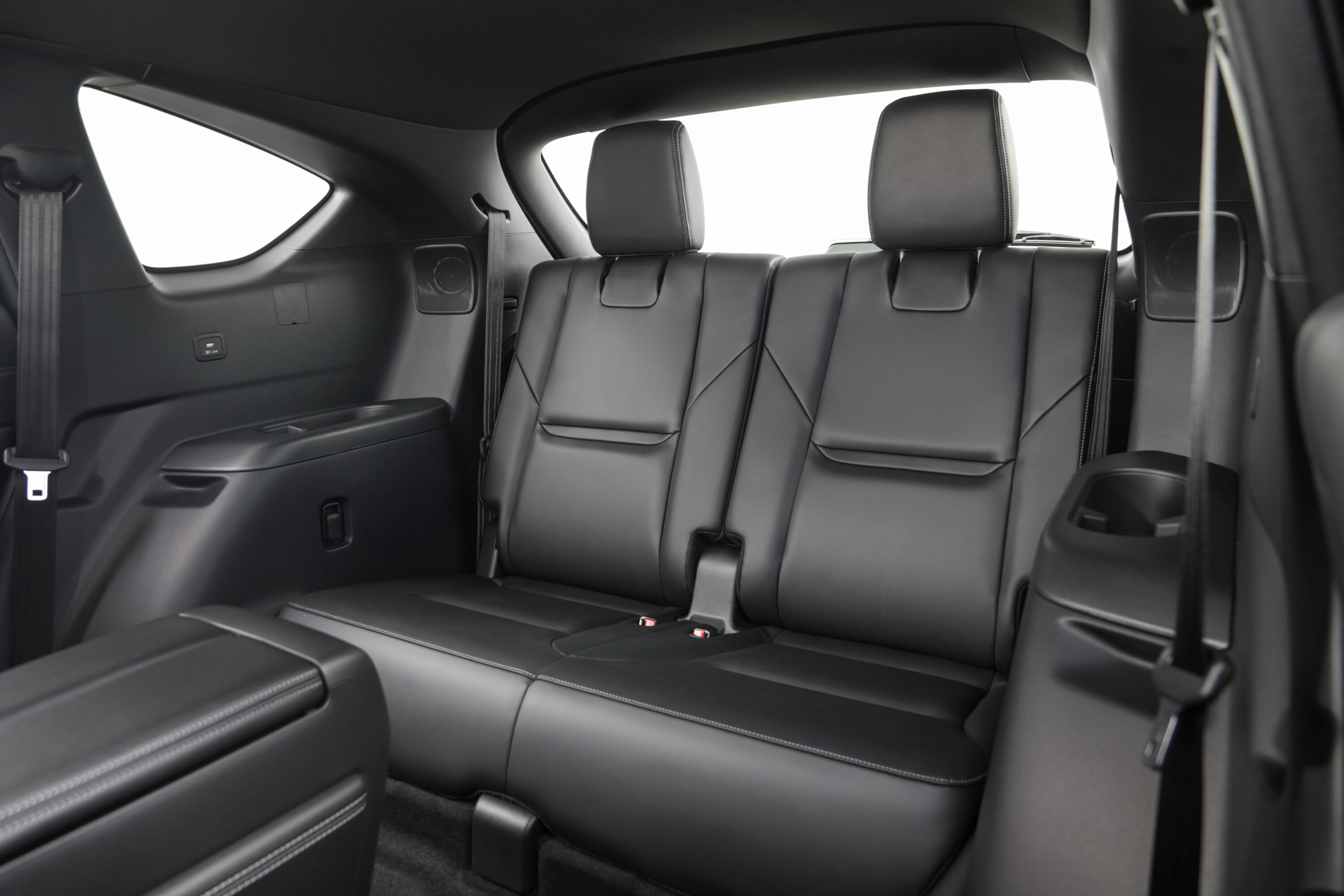
The large SUV wheelbase means the driver and front passenger shouldn’t have any trouble with space, and it’s essentially the same for the second row – but its elevated stadium-like pews and midsized 1840mm width, identical to the CX-5, mean head and shoulder room aren’t quite as accommodating as its competitors.
The third row is accessed by the slow-moving one-touch ‘walk-in’ function, with expansive head and legroom for adults, with the latter aided by the ability to slide the central row forward.
The rear doors open almost 90 degrees to help ingress and egress. When you’re loading in car seats, there are outboard ISOFIX points. It also has top-tether points for all rear seats, including the final row, meaning you could theoretically fit four or five child seats in the CX-8.
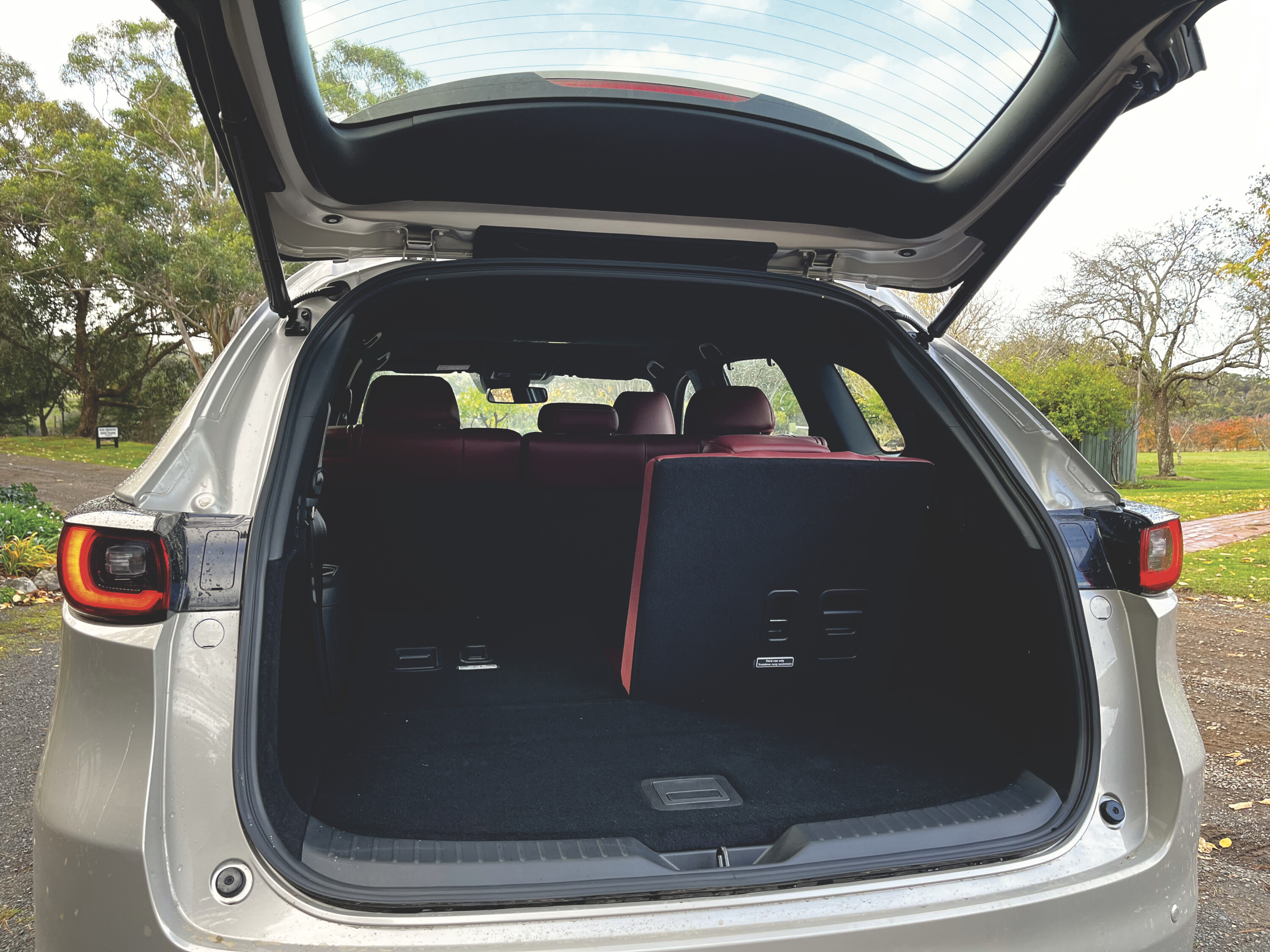
2023 Mazda CX-8 boot space
The Mazda CX-8 has a 209-litre luggage capacity with all seats in place, rising to 742L with the third row folded and 1727L with both rows down.
This is a 304L and 289L improvement, respectively, over the CX-5. There’s also a handy 33L underfloor storage compartment with a space-saver spare beneath.
The boot has four D-shaped tie-down points, two shopping hooks, a 12-volt power outlet, and USB-A charge ports for the GT SP and above.
Mini matchup: Boot space
| MODEL | WHEELBASE | BOOT |
|---|---|---|
| Mazda CX-8 | 2930mm | 209L/775L/1727L |
| Kia Sorento | 2815mm | 187L/616L/2001L |
| Hyundai Santa Fe | 2765mm | 130L/782L/1649L |
| Volkswagen Tiguan Allspace | 2791mm | 230L/700L/1775L |
Technology in the cabin
Mazda has provided a significant – but not giant – technological leap forward for the CX-8 in 2023.
Like its CX-5 twin, all CX-8s now have a larger 10.25-inch Mazda Connect infotainment system and a 7-inch semi-digital instrument cluster.
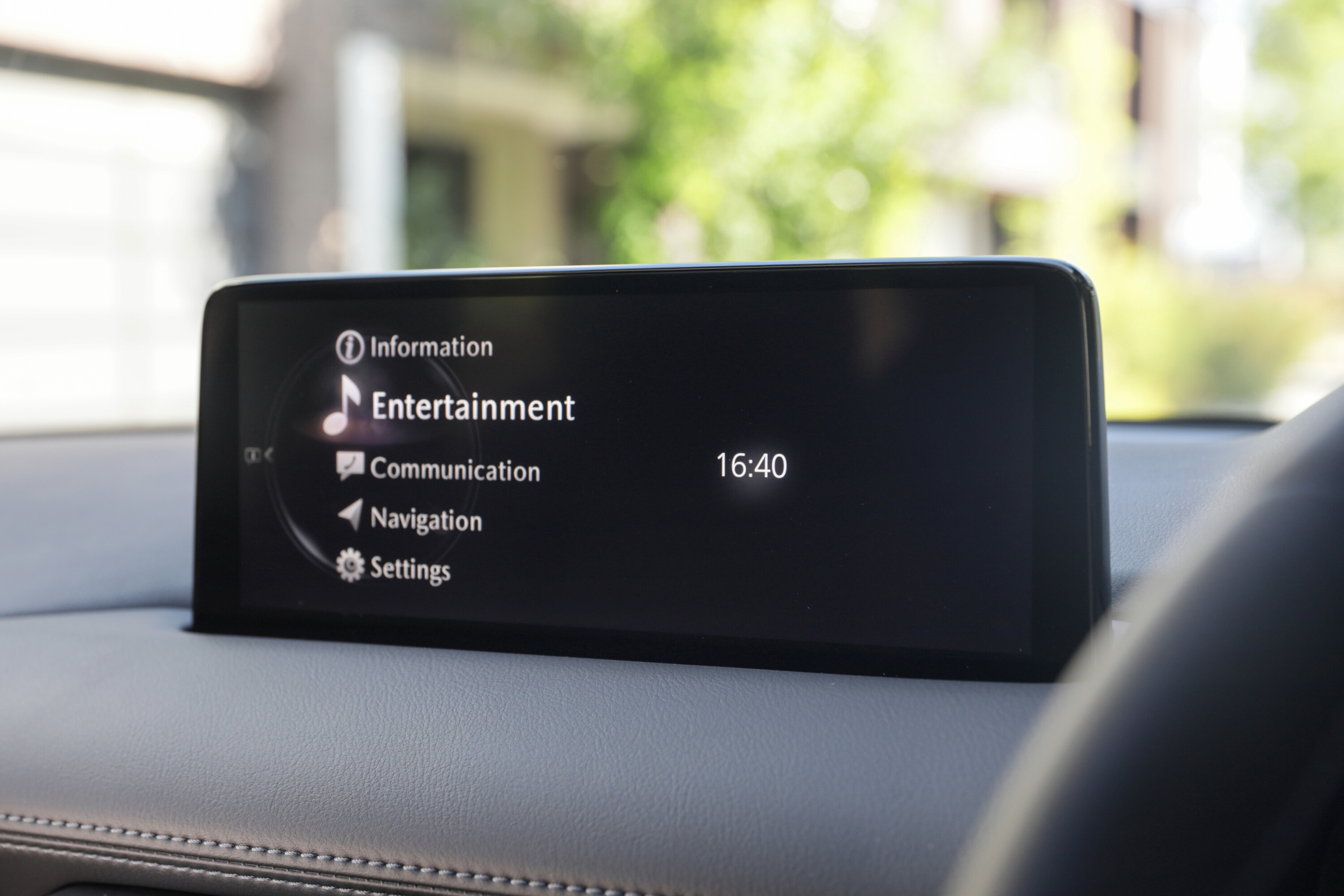
The former replaced the ageing 8-inch MZD Connect system on the Sport and Touring, fixing our strongest criticism with entry-level versions of the pre-facelift model.
As before, it has no touch functionality, with the entire system controlled by a rotary dial, which can be cumbersome at first but relatively easy to get used to – particularly when the screen is positioned too far back if you could touch it.
Also new for the latest model-year CX-8 are wireless Apple CarPlay and Android Auto, plus two USB-C ports in the centre console. All other ports retain the classic USB-A type.
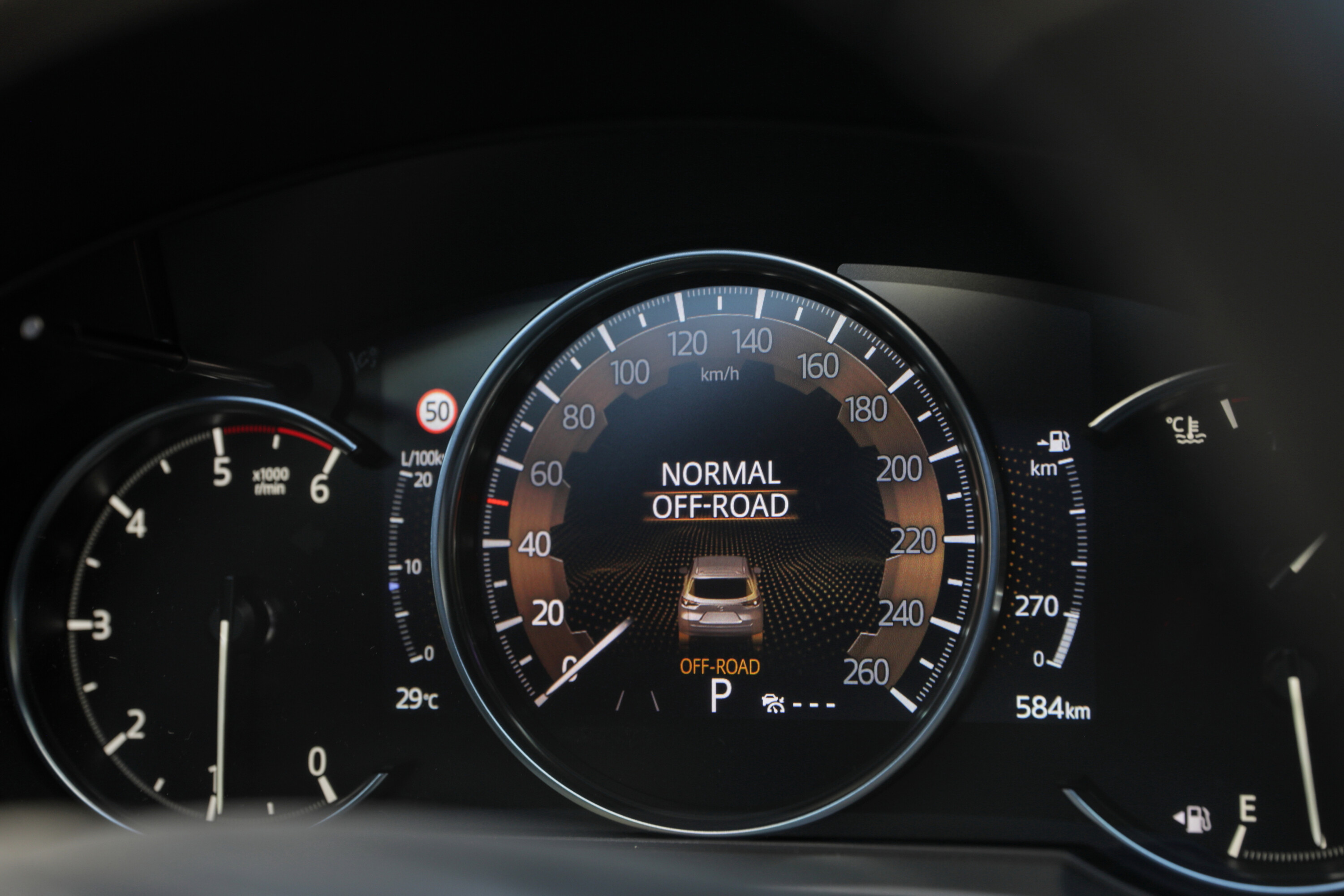
This includes the second-row chargers for the Touring and above, which are hidden in the centre armrest – meaning devices can’t be topped up if all three seats are in use.
Mazda’s latest SUVs – the CX-60 and CX-90 – have USB-C ports throughout, with the second-row outlets positioned on the back of the centre console, which will hopefully soon filter into older models, like the CX-8.
The standard windscreen-projected head-up display remains an outlier in this segment five years on, with brilliant clarity and a legible display when wearing polarised sunglasses.
What is the CX-8 like to drive?
If you prefer a spirited drive but need to cart the kids, the CX-8 is a large SUV that ticks the correct box.
While the added mass and longer wheelbase mean it isn’t as poised as its CX-5 mid-size SUV sibling, it remains composed with commendable road manners.
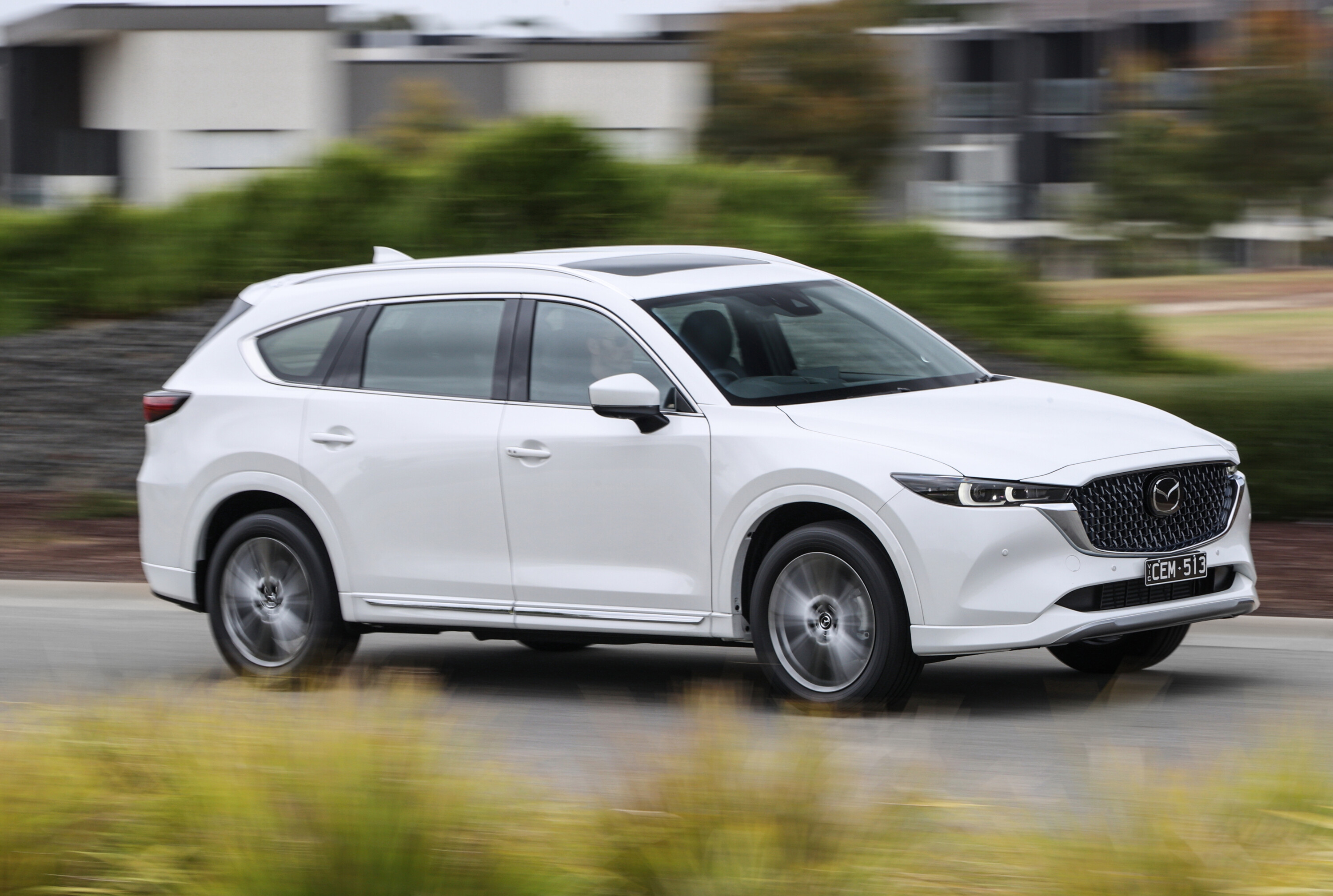
Body roll is fair given the high centre of gravity, and lateral head movement is kept in check. Steering feels accurate at all points, and the brake pedal action and response is smooth. Boxes ticked.
Under the bonnet, Mazda provides two engine choices: a 2.5-litre naturally-aspirated four-cylinder petrol or 2.2-litre twin-turbocharged four-cylinder diesel.
In a simplistic strategy similar to the Korean twins, the petrol is front-wheel-drive only, while the diesel has an intelligent all-wheel-drive system to power all four wheels when required.
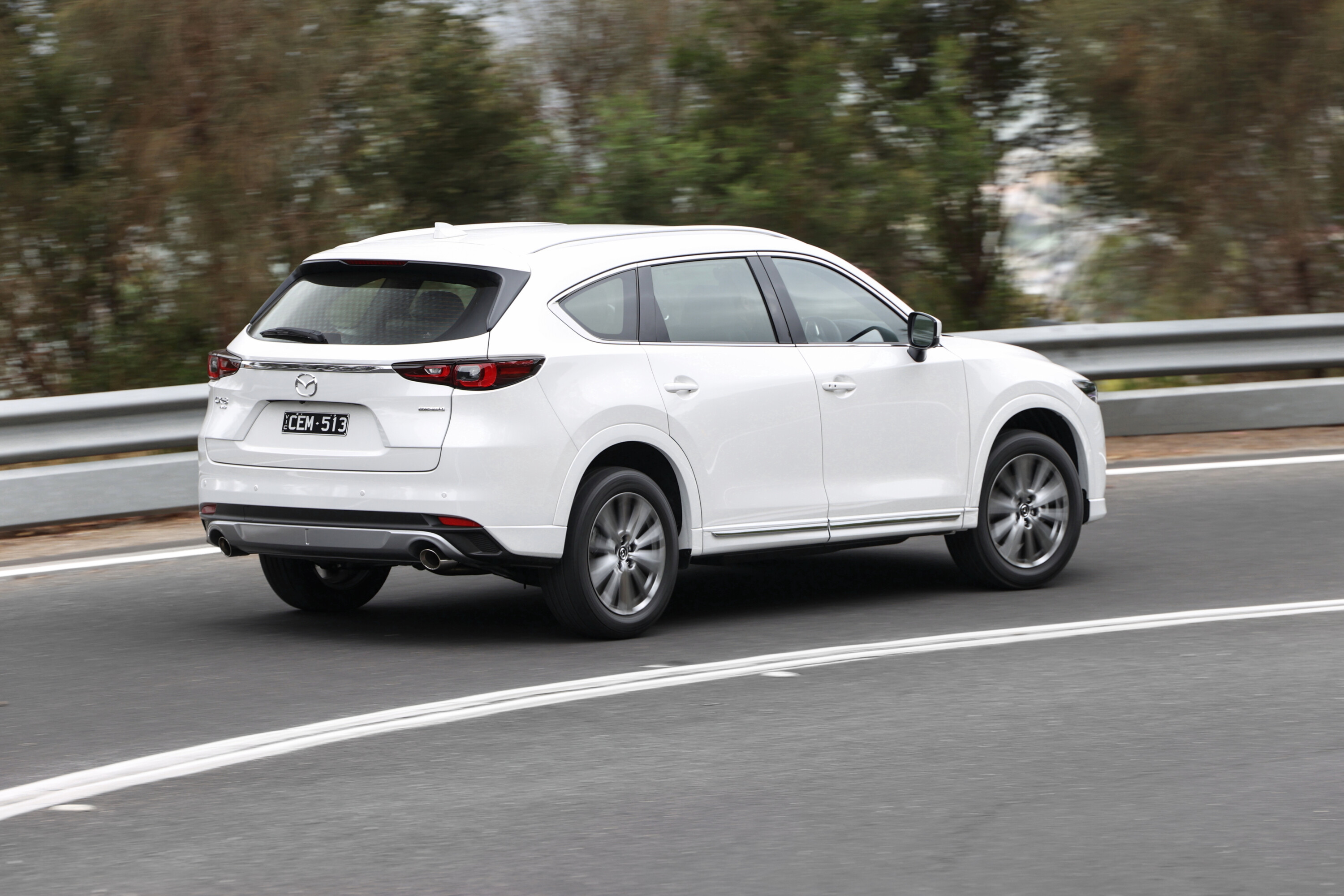
The petrol CX-8 produces a reasonable 140kW, but the lack of forced induction means it has just 252Nm to pull its circa-1750 kilogram mass.
Both of those outputs are developed relatively high in the rev range. It’s fine in low-stress environments, but there’s a noticeable lack of grunt in certain situations, such as when overtaking or travelling up a steep hill on a country road.
That’s not to say the petrol feels like it lacks confidence in these environments, but it’ll become vocal – and it isn’t helped by the anachronistic six-speed automatic transmission, which could benefit from additional gear ratios to assist with acceleration at higher speeds.

In contrast, the diesel is a smooth operator. With an identical power figure but an additional 198 Newtons to play with – at 140kW/450Nm – it provides an excellent driving experience with more than enough grunt for nearly everything. And, best of all, you won’t hear about it with excellent noise insulation, even in acceleration.
A ‘Mi-Drive’ off-road mode has been added for diesel variants, but it comes at the cost of sport mode, which is now exclusive to petrol models.
- What is a Powertrain or Drivetrain?
- Power vs torque
- Car suspension explained
- Automatic transmissions (‘gearboxes’) explained
- Chassis control systems explained
- Car vs Ute vs SUV: How the vehicle you buy should guide the way you drive
If any of the terms in this section has left you scratching your head, these articles will help bring you up to speed!
How is it on fuel?
The petrol Mazda CX-8 is rated to use 8.1L/100km in combined ADR testing, while the diesel is listed at a decent 6.0L/100km.
At the launch event, we sampled both, with a petrol G25 Touring example returning 9.8L/100km at the end of a spirited drive on Victorian back roads – including some gravel sections. It is compatible with 91 RON unleaded.
Recent seven-day testing by the Wheels Media team in a diesel Asaki LE example returned 7.9L/100km, with a similar result seen during our limited time in another diesel at the launch.
Both powertrains have an idle stop/start system and a similarly sized fuel tank – 72 litres for the petrol and 74L for the diesel.
Mini matchup: Fuel consumption
Petrol rivals
| Model | Minimum ROB | WLTP (combined) |
|---|---|---|
| Mazda CX-8 G25 | 91 RON | 8.1L/100km |
| Kia Sorento V6 | 91 RON | 9.7L/100km |
| Hyundai Santa Fe V6 | 91 RON | 10.5L/100km |
| VW Tiguan Allspace 132TSI | 95 RON | 8.9L/100km |
Diesel rivals
| Model | WLTP (combined) |
|---|---|
| Mazda CX-8 D35 | 6.0L/100km |
| Kia Sorento diesel | 6.1L/100km |
| Hyundai Santa Fe diesel | 6.1L/100km |
| VW Tiguan Allspace 147TDI | 6.2L/100km |
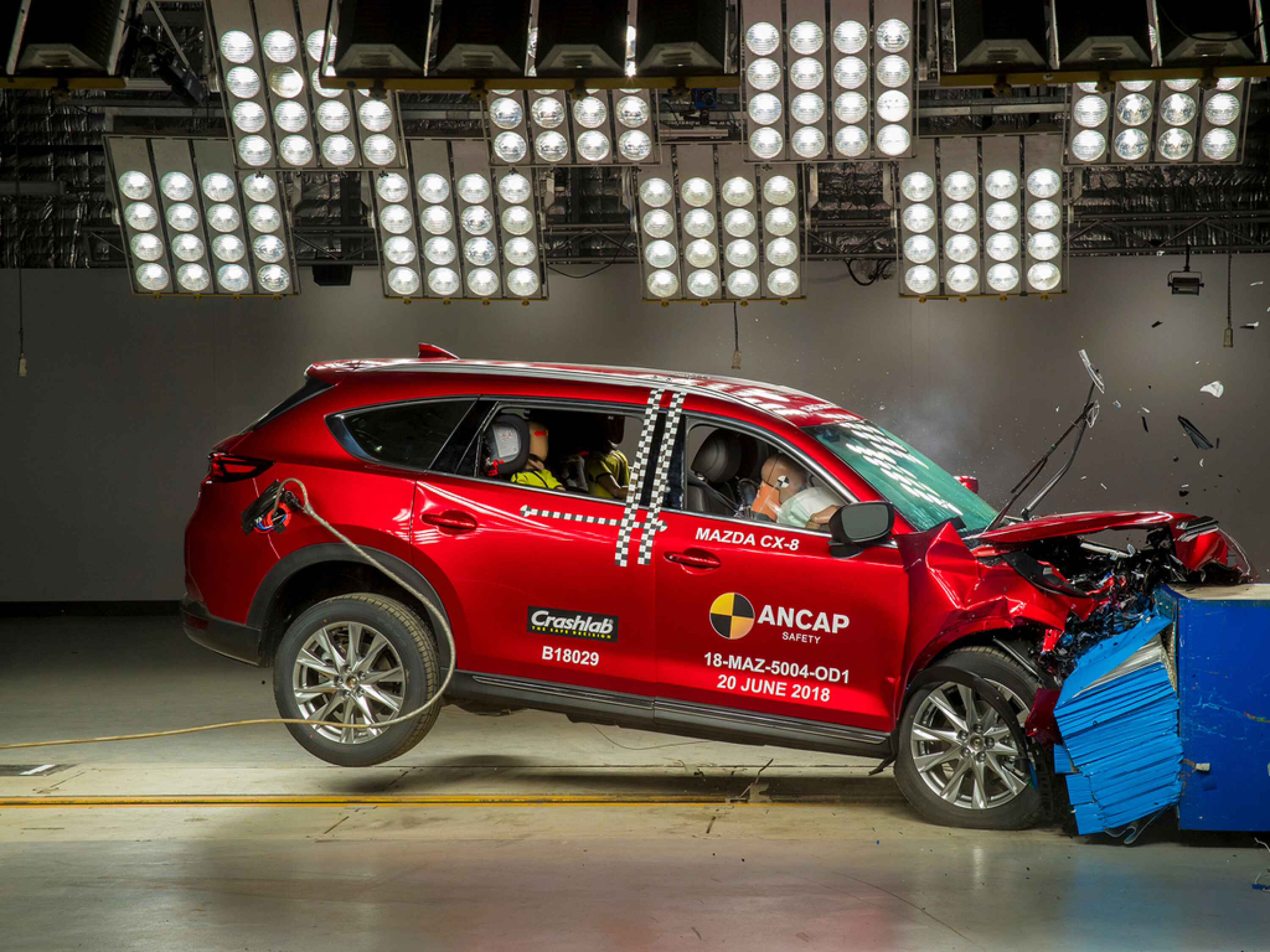
How safe is it?
The Mazda CX-8 is covered by a five-star ANCAP safety rating, based on testing conducted in 2018.
This rating will expire in December 2024, in line with ANCAP’s six-year datestamp expiry. Mazda said it has no plans to retest the CX-8 or other vehicles in Australia at this stage.

Six airbags – dual front, side and curtain – are fitted, including coverage for third-row passengers. It has no knee or front-centre airbags to prevent head clashes between the driver and front passenger in a side-impact collision.
As standard, the CX-8 includes a full suite of active safety technology, including autonomous emergency braking (vehicle, pedestrian, cyclist and reverse), adaptive cruise control, lane-keep assist, lane departure warning, blind-spot alert, rear cross-traffic alert, auto high-beam, traffic sign recognition and intelligent speed limit assistance.

Unlike some of its rivals, the CX-8 is less prone to interrupting you with potentially distracting chimes and warnings or tugs at the steering wheel for its lane-keep assist.
Traffic jam assist – a combination of adaptive cruise control and lane-keep assist – for the GT SP and above allows for semi-autonomous driving in slow-moving traffic, which is a handy addition.
Warranty and running costs
As with all Mazdas, the CX-8 is covered by a five-year, unlimited-kilometre warranty.
It has five years of capped-price servicing and roadside assistance, with no requirement for annual dealer servicing to retain the service, unlike some other manufacturers.
The petrol CX-8’s service intervals now align with most of its competitors at 12 months or 15,000 kilometres, whichever occurs first – up from 10,000km.
However, Mazda’s diesel vehicles – except the BT-50 – retain a shorter 12-month/10,000km interval, meaning buyers who travel the average yearly distance of around 12,100 kilometres need to service their CX-8 more frequently than an equivalent Sorento, Santa Fe or Tiguan Allspace.
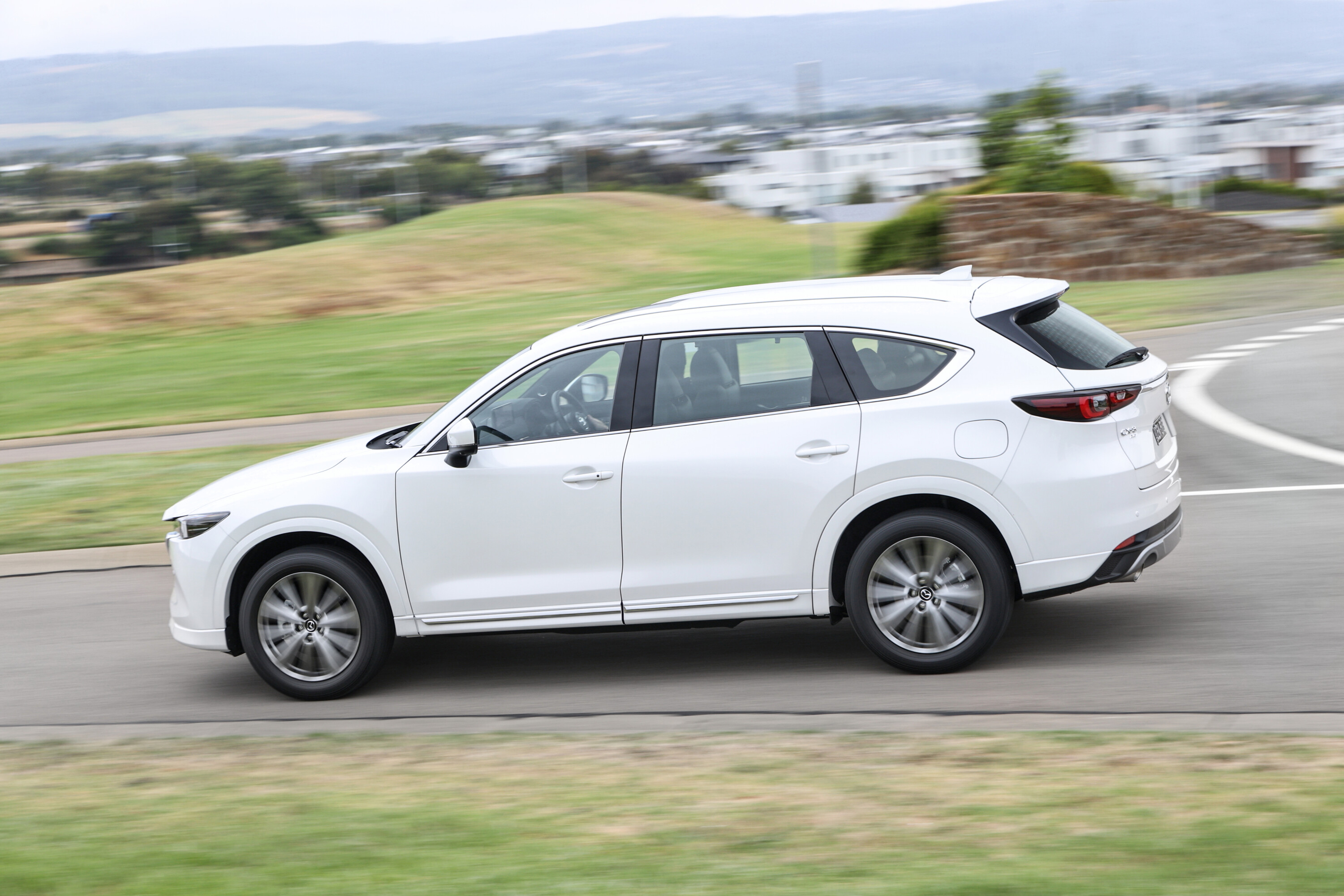
VERDICT
The mid-life update for the Mazda CX-8 large SUV has bolstered a well-received product with a sharpened look and the latest tech.
With the discontinuation of its larger CX-9 sibling at the end of this year, the CX-8 needs to step up as Mazda’s sole budget-focused three-row option – and the facelift means it should do a more convincing job.
Now that the CX-9’s no longer, you might be disappointed that its excellent turbo-petrol won’t be transplanted into the CX-8. However, depending on your circumstances, the current powertrains will likely be more than enough.
If you want a quality large SUV with minor use of the third row, the CX-8 is worth shortlisting against its equally well-liked competition.
However, the Mazda CX-8 isn’t without its caveats, particularly the smaller, narrow footprint that impacts the most critical factor for any three-row SUV: cabin space.
And, with the non-turbo petrol battling some lethargy on the open road, the turbo-diesel CX-8 is the clear pick if you spend time outside the ‘burbs.
| 2023 Mazda CX-8 G25 Touring petrol FWD automatic | ||
|---|---|---|
| Engine | 2.5-litre naturally-aspirated four-cylinder petrol | |
| Power @rpm | 140kW @6000rpm | |
| Torque @rpm | 252Nm @4000rpm | |
| Transmission | Six-speed torque-converter automatic | |
| Body | Seven-seat large SUV | |
| L/W/H | 4925/1845/1720mm | |
| Wheelbase | 2930mm | |
| Boot space | 242L / 775L / 1727L | |
| Weight | 1720kg | |
| Fuel / tank | petrol / 72 litres | |
| Fuel use L/100km | 8.1L (claimed) | 9.8L (on test) |
| Suspension | Front: struts / Rear: multi-link | |
| Steering | Electric rack-and-pinion; 11.6Mu00a0 | |
| Brakes | Front: ventilated discs / Rear: solid discs | |
| Wheels | 17-inch diameter | |
| Tyres | Yokohama Geolander G98u00a0 | |
| Tyre size & spare | 225/65R17, space-saver spare | |
How about a medium SUV?
Score breakdown
Things we like
- Smooth, torquey diesel
- Refined cabin
- Third-row can seat adults
Not so much
- No daytime running lamps for base variants
- Lethargic non-turbo petrol
- Tight rear headroom
We recommend
-
News
2023 Mazda CX-8 pricing and features
Mazda's popular CX-8 large SUV has gained an updated look, more technology and two new variants for 2023 – but pricing has increased by up to $1550
-
 Reviews
Reviews2021 Mazda CX-8 Touring SP petrol review
Mazda revives sporty SP nameplate for pragmatic three-row SUV
-
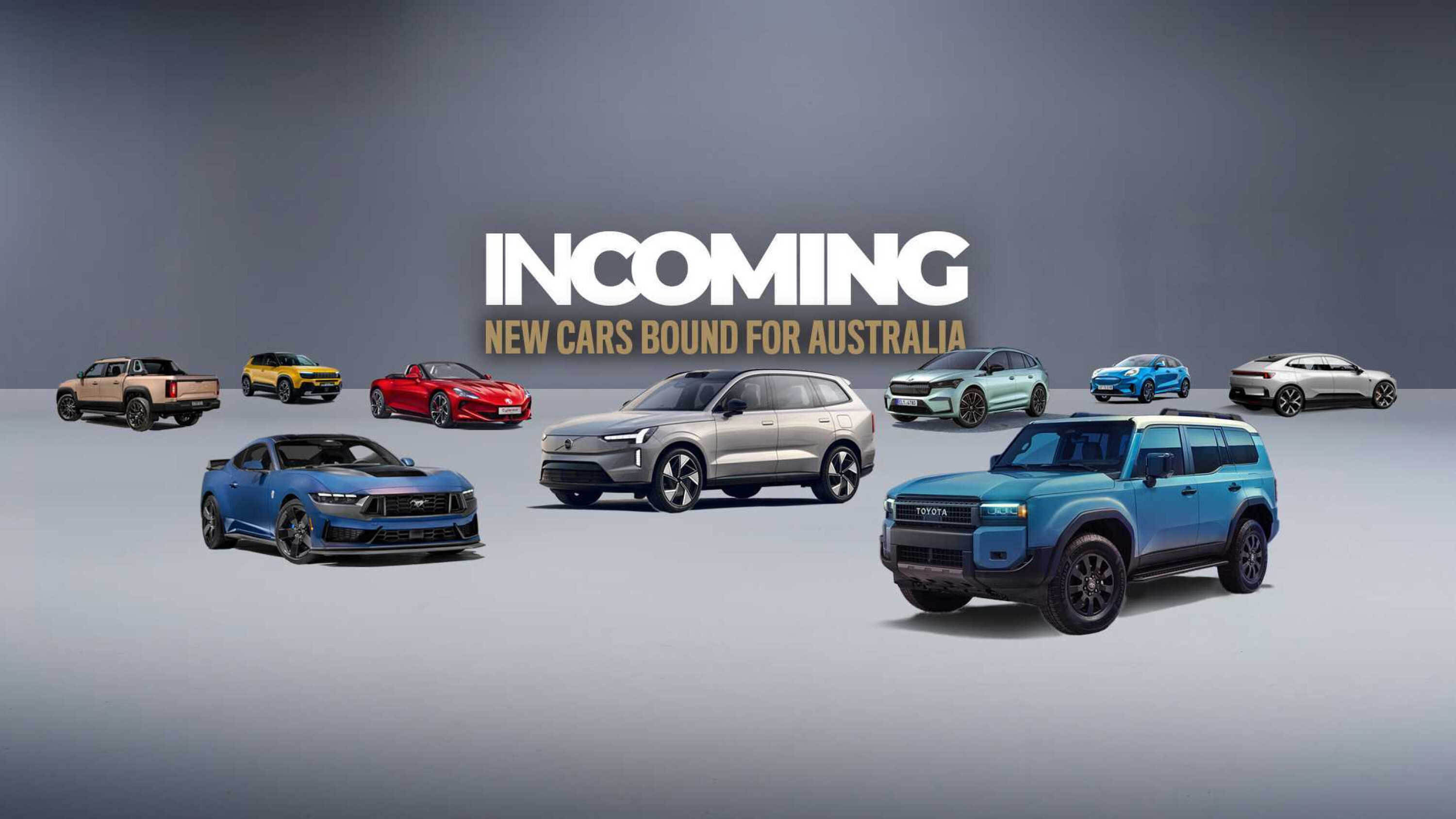 News
News2025 New Car Calendar: All the new cars coming to Australia
Take a look at our list of what is expected to launch in Australia in 2025 – plus those we might not see locally just yet


